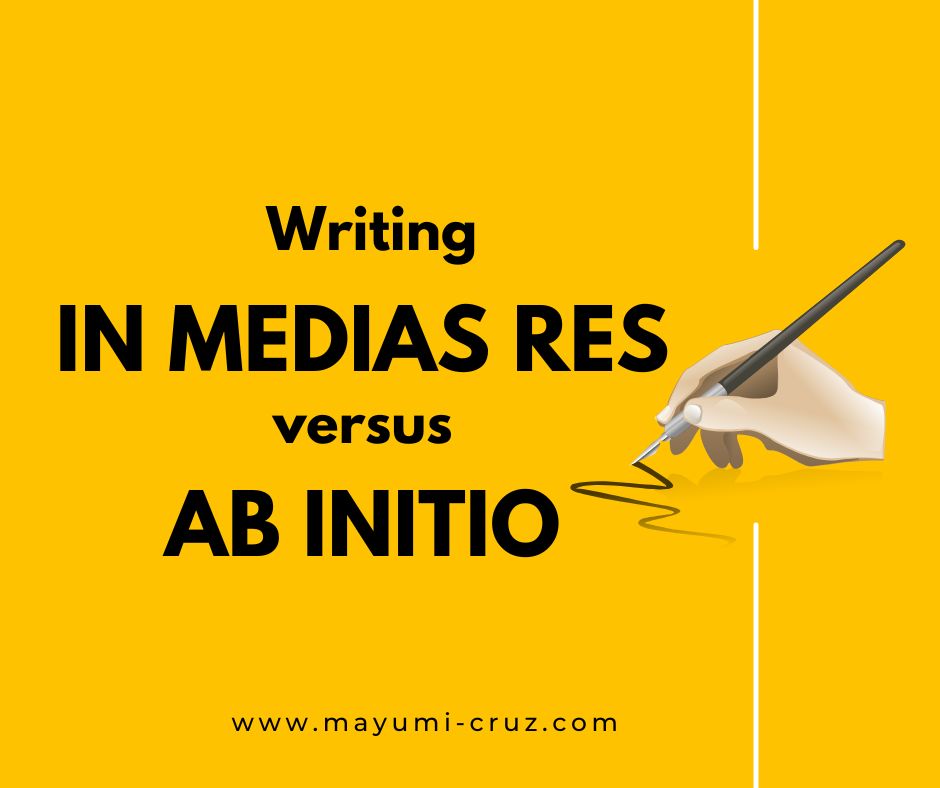Writing In Medias Res versus Ab Initio
Writing In Medias Res has its pros and cons — and so does writing Ab Initio
The other night, I had a brief but interesting conversation with one of my readers.
She observed that the last book of mine which she has just read, and even the one she’s currently reading, starts somewhere at the middle of the story — unlike many books of other authors which typically start with settings and descriptions.
I agreed, explaining that I prefer to write in medias res, a Latin phrase for “in the middle of things.”
Writing in medias res means starting the story in the middle of the action, where the reader is immediately thrust into a scene or situation without much context or background information. The physical aspects of the story’s world unfolds as the story progresses.
It’s different from writing ab initio. Writing ab initio means starting the story at the beginning, providing readers with a comprehensive understanding of the setting, characters, and plot before diving into the action.
Both approaches have their pros and cons. Choosing between these two largely depends on the type of story being told and the writer’s personal preference.
Writing In Medias Res: Pros and Cons
In Medias Res Pros:
Writing in medias res is a popular choice for action-packed stories or those with high stakes. By starting in the middle of the action, the writer can:
immediately capture the reader’s attention
create a sense of urgency that keeps readers engaged
useful for stories with complicated plot lines or multiple perspectives.
allows the writer to introduce characters and plot elements gradually, avoiding a large amount of exposition at the beginning.
In Medias Res Cons:
Writing in medias res also has its challenges. These are:
- it can be difficult to provide enough context and background information to fully engage readers, as they may feel lost or confused if they don’t have enough information.
- this can also lead to a lack of character development, as readers may not have enough time to get to know the characters before they’re thrown into the action.
As an author who prefers writing in medias res, I make sure that I overcome all these challenges by providing the necessary information which the readers need to know. I also make sure that my characters are developed as the story progresses by providing back stories and sub-plots.
Writing Ab Initio: Pros and Cons
Meanwhile, here are the Pros and Cons of writing ab initio.
Ab Initio Pros:
- provides readers with a comprehensive understanding of the story’s setting, characters, and plot before the action begins.
- this allows for more character development and can help readers establish a connection with the characters early on.
- allows the writer to provide more exposition and background information, which can be useful for complex stories or those set in unfamiliar worlds
Ab Initio Cons:
- it may take longer to get to the action
- can risk losing the reader’s attention before the story really gets going.
- it can also be more difficult to maintain a sense of tension and urgency, as readers may already know what’s going to happen before it does.
Ultimately, the choice between writing in medias res and writing ab initio comes down to the story being told and the writer’s personal preference.
Both these approaches have their benefits and drawbacks.
The best choice will depend on the writer’s goals for their story and the type of experience they want to create for their readers.
Personally, as an author, I like my readers to be totally engrossed and be completely into the story from the start, which is why I prefer writing in medias res.
But maybe one of these days, I would also like to write ab initio.
Here are some of my books which start in medias res:
How about you?
If you’re a writer, which do you prefer: writing in medias res, or writing ab initio?
If you’re a reader, do you prefer reading stories starting with descriptions and settings, or do you want to immediately get into the middle of the action?
Tell me your thoughts in the comments below!









